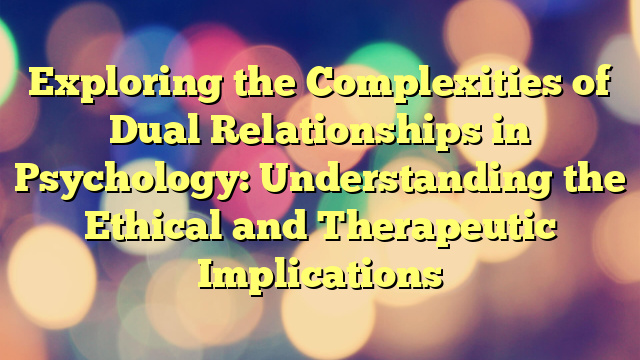Exploring the Complexities of Dual Relationships in Psychology: Understanding the Ethical and Therapeutic Implications
Exploring the Complexities of Dual Relationships in Psychology: Understanding the Ethical and Therapeutic Implications
Introduction
Dual relationships in psychology refer to situations where a therapist or mental health professional has a relationship with a client outside of the therapeutic setting. This can include personal, social, or business relationships. While dual relationships are not inherently unethical, they can create complex ethical and therapeutic implications that must be carefully considered. In this article, we will explore the complexities of dual relationships in psychology and discuss the ethical and therapeutic implications of these relationships.
Types of Dual Relationships
- Personal relationships: This occurs when a therapist has a personal relationship with a client outside of the therapeutic setting. This can include friendships, romantic relationships, or family relationships.
- Business relationships: This occurs when a therapist has a business relationship with a client outside of the therapeutic setting. This can include hiring a client for a job or providing services to a client outside of therapy.
- Social relationships: This occurs when a therapist has a social relationship with a client outside of the therapeutic setting. This can include attending social events together or participating in a shared hobby or interest.
The Ethical Implications of Dual Relationships
Dual relationships can create ethical dilemmas for mental health professionals. The American Psychological Association (APA) has established guidelines for ethical behavior in psychology, including guidelines for dual relationships. These guidelines state that psychologists should avoid dual relationships whenever possible, as they can create conflicts of interest and impair professional judgment. One of the primary ethical concerns with dual relationships is the potential for exploitation. When a therapist has a personal or business relationship with a client, there is a risk that the therapist may exploit the client for personal gain. For example, a therapist may hire a client for a job or invest in a client’s business, creating a conflict of interest that could compromise the therapist’s professional judgment. Another ethical concern with dual relationships is the potential for boundary violations. When a therapist has a personal or social relationship with a client, it can be difficult to maintain appropriate boundaries in the therapeutic relationship. This can lead to confusion and discomfort for the client, and may compromise the effectiveness of therapy.
The Therapeutic Implications of Dual Relationships
In addition to ethical concerns, dual relationships can also have therapeutic implications. When a therapist has a personal or social relationship with a client, it can create a power dynamic that can be difficult to navigate. The client may feel obligated to maintain the relationship, even if it is not in their best interest, or may feel uncomfortable sharing personal information with the therapist. Dual relationships can also create conflicts of interest that can compromise the therapeutic relationship. For example, if a therapist has a personal relationship with a client, they may be more likely to overlook or minimize the client’s problems in order to maintain the relationship. This can prevent the client from receiving the help they need and can ultimately harm their mental health.
When Dual Relationships May Be Appropriate
While dual relationships are generally discouraged in psychology, there may be situations where they are appropriate. For example, in small communities or rural areas, it may be difficult for clients to find a therapist who is not already known to them. In these situations, a dual relationship may be necessary in order to provide the client with the care they need. Another situation where a dual relationship may be appropriate is in the case of a long-term therapy relationship. If a therapist has been working with a client for many years, it may be difficult to avoid all forms of dual relationships. In these situations, the therapist should carefully consider the potential risks and benefits of the relationship and take steps to minimize any potential harm to the client.
Conclusion
Dual relationships in psychology can create complex ethical and therapeutic implications that must be carefully considered. While dual relationships are generally discouraged, there may be situations where they are appropriate. Mental health professionals must be aware of the potential risks and benefits of dual relationships and take steps to ensure that they are acting in the best interests of their clients. By understanding the complexities of dual relationships, mental health professionals can provide effective and ethical care to their clients.

